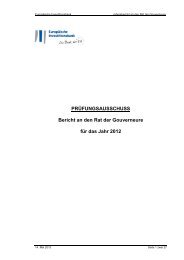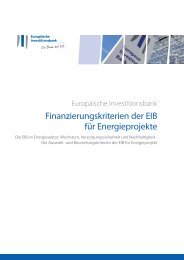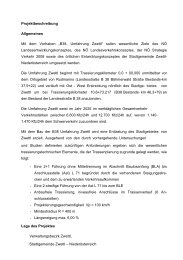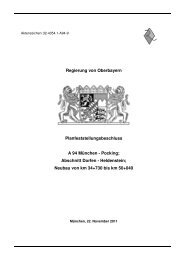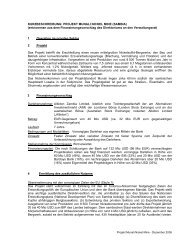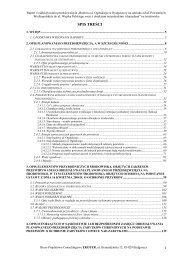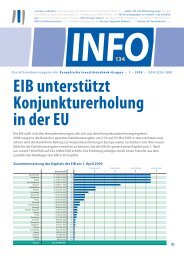EIB Papers Volume 13. n°1/2008 - European Investment Bank
EIB Papers Volume 13. n°1/2008 - European Investment Bank
EIB Papers Volume 13. n°1/2008 - European Investment Bank
Create successful ePaper yourself
Turn your PDF publications into a flip-book with our unique Google optimized e-Paper software.
A common feature for<br />
the new member states<br />
is the significance of<br />
investment in public<br />
goods.<br />
32 <strong>Volume</strong>13 N°1 <strong>2008</strong> <strong>EIB</strong> PAPERS<br />
Decentralisation thus increases the level of government investment in total, and of the<br />
components it increases investment in infrastructure (INF); hospitals and schools (HS); and<br />
public goods (PG). Decentralisation does not affect the level of redistribution investment. In<br />
terms of shares in total government investment, decentralisation increases the relative share of<br />
investment in hospitals and schools, at the cost of investment in redistribution. Note, however,<br />
that although the relative share of redistribution investment declines with decentralisation, its<br />
absolute level does not.<br />
The result that decentralisation reduces the share of redistribution investment is difficult to<br />
reconcile with the traditional theory of fiscal federalism reviewed earlier. The redistribution<br />
variable is meant to capture consumption-oriented local public goods, such as recreational<br />
facilities, and the traditional view predicted that decentralisation should lead to an increase, not<br />
relative decline, in their provision.<br />
In contrast, the results can be more readily interpreted in view of the newer thinking<br />
emphasising broader fiscal competition among sub-national units. Decentralisation increases<br />
the level of investment in especially infrastructure as well as hospitals and schools, all providing<br />
“public inputs” for private firms. What is more, the increase in investment in hospitals and<br />
schools suppresses the share of investment in redistribution, suggesting that decentralisation<br />
leads to a relative decline in consumption-oriented government investment.<br />
It is noteworthy that decentralisation does not lower the level of any type of government<br />
investment. This being the case, there is no evidence of decentralisation being associated<br />
with tax competition that would have a detrimental impact on the overall level of government<br />
investment.<br />
We now turn to a description of the composition of government investment in the new member<br />
states for which data are available. There are, again, big differences in the composition of government<br />
investment between individual NMS, as shown in Figure 5, which also contrasts the composition of<br />
government investment in NMS to the cohesion countries. At one end of the spectrum, the Czech<br />
Republic invests in government infrastructure even more than the cohesion countries. At the<br />
other end of the spectrum, Latvia and the Slovak Republic invest in government infrastructure no<br />
more or even less than old EU member states. On the other hand, a common feature for almost all<br />
NMS is the significance of investment in public goods, including defence, order and safety, public<br />
administration and the environment. Bar in the Czech Republic, the share of public goods is well in<br />
excess of one-quarter of aggregate government investment in NMS, 5 compared to one-fifth in the<br />
cohesion countries and about one-quarter in other EU-15 countries.<br />
5 In a more detailed breakdown, the shares of defence, order and safety, public administration, and the environment in<br />
investment in public goods are, on average, roughly speaking equal in the eight new member states shown in Figure 5.<br />
The share of public administration is slightly higher than the others, and to the extent that such investment is linked to<br />
the development of institutions necessary for a well-functioning market economy, such investment enhances long-term<br />
growth potential.




